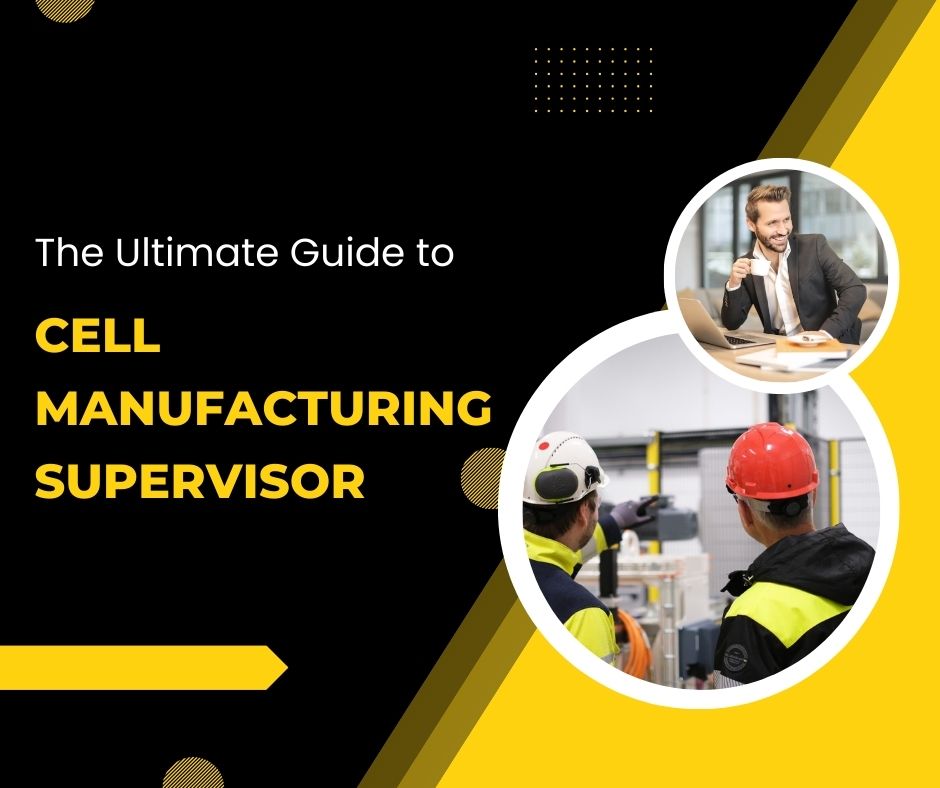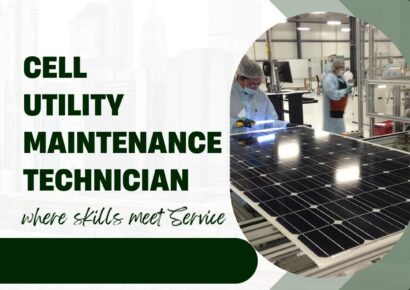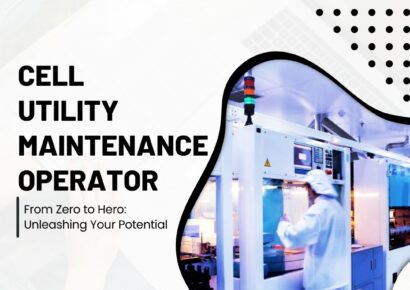Currently Empty: ₹0.00
Cell Manufacturing Supervisor
About Course
A cell manufacturing supervisor plays a pivotal role in overseeing the production of photovoltaic (PV) cells, which are essential components of solar panels. They are responsible for managing and leading a team of technicians, ensuring efficient manufacturing processes, adhering to safety and quality standards, and meeting production targets. Additionally, they monitor equipment performance, troubleshoot issues, and implement process improvements to enhance productivity and product quality. Cell manufacturing supervisors play a critical role in the renewable energy sector, contributing to the production of clean and sustainable energy solutions.
What Will You Learn?
- The learning outcomes of a cell manufacturing supervisor typically include:
- 1. Proficiency in overseeing cell production processes, ensuring adherence to quality standards and productivity goals.
- 2. Effective leadership and team management skills for coordinating and motivating production teams.
- 3. Knowledge of safety protocols and regulatory compliance in cell manufacturing.
- 4. Problem-solving abilities to address production challenges and optimize workflows.
- 5. Enhanced communication and interpersonal skills for fostering a collaborative and efficient manufacturing environment in the photovoltaic industry.
Audience
- Qualification: Bachelor of Engineering
- Age: 24+ years
- Experience: 3-5 Years
Course Content
Basics to PV Cell
Photovoltaic (PV) cells, often referred to as solar cells, are the fundamental building blocks of solar panels. These cells are semiconductor devices that convert sunlight into electricity through the photovoltaic effect. When exposed to sunlight, PV cells generate a flow of electrons, creating a direct current (DC) electrical output. Multiple PV cells are interconnected within solar panels to produce usable electricity. PV cells are crucial in harnessing renewable solar energy and contribute to sustainable power generation, making them a key component of the global transition toward clean and green energy sources. Understanding the basics of PV cells is essential for anyone involved in solar energy production and related industries.
-
Basics of Semiconductor
01:51 -
Solar Cell Principles & Production Environment
00:00
Cell Quality
Cell quality in cell manufacturing process refers to the standard of photovoltaic (PV) cells produced, which directly impacts the efficiency and performance of solar panels. It encompasses aspects like cell uniformity, material purity, electrical characteristics, and defect detection. Maintaining high cell quality is essential for optimizing the energy output and durability of solar panels, ensuring their long-term effectiveness in harnessing solar energy.
-
KY-SOP-CL-002 Standard Operating Procedure for LID and LeTID
00:00 -
KY-SOP-CL-003 Standard operating procedure for cell shop cleanliness testing
00:00 -
Establishment of Sorting Rules
00:00 -
7 Big Techniques of QC
00:00 -
KY-QIS-CL-002 Incoming inspection standard for wafer
00:00 -
KY-QIS-CL-003 Incoming inspection standard for cell packaging materials
00:00 -
KY-QIS-CL-004 Incoming inspection standard for Cell paste
00:00 -
KY-QMR-CL-006 Cell Quality Control Plan
00:00 -
Finished Product Appearance Inspection Standard Training
00:00 -
Finished Product EI Inspection Standard Training
00:00 -
1 KY-SOP-CL-001 Standard Operating Procedure for Cell Electrode Tension Test
00:00 -
2 KY-SOP-CL-004 Standard Operating Procedure Cell Electrode Welding Operation
00:00 -
KY-QMR-CL-001 Standard Sampling Specification for Finished Cell Products
00:00 -
KY-QIS-CL-005 Incoming Inspection Standard for Cell Screen
00:00 -
Classification Detection & EL Process
00:00 -
Solar Cell Cost Reduction & Efficiency Improvement Training
00:00 -
Cell Reliability Test-1
00:00 -
Cell Reliability Test-2
00:00 -
Quick Review
Cell Production
A cell production line is a highly specialized manufacturing facility dedicated to the fabrication of photovoltaic (PV) cells, the core components of solar panels. These production lines typically comprise a series of meticulously controlled processes, including wafer preparation, doping, etching, metallization, and testing.
Key considerations in a cell production line include maintaining a cleanroom environment to minimize contamination and ensuring precise temperature and humidity control. Advanced automation and robotics are often employed to enhance efficiency and accuracy.
The goal of a cell production line is to produce high-quality PV cells that meet efficiency and quality standards for use in solar modules. These cells play a pivotal role in the harnessing of solar energy, contributing to renewable and sustainable power generation.
-
Texturing Cleaning Process
00:00 -
PERC Process
00:00 -
Diffusion Process
00:00 -
Etching Process
00:00 -
PECVD Process
00:00 -
Silk Screen Printing & Sintering Process
00:00 -
Classification Detection & EL Process
00:00 -
Solar Cell Cost Reduction & Efficiency Improvement Training
00:00 -
Site Management Training
00:00 -
Quick Review-2
6s Occupational Health, Safety, and Environment (OHSE)
6S Occupational Health, Safety, and Environment (OHSE) is a comprehensive approach to workplace management focused on creating a safe and environmentally responsible environment in the cell manufacturing industry.
The 6S principles involve Sort, Set in order, Shine, Standardize, Sustain, and Safety. These steps encompass organizing the workspace, maintaining cleanliness, establishing standardized procedures, and promoting a culture of safety and environmental responsibility.
Implementing 6S OHSE in the cell manufacturing line enhances worker safety, reduces accidents, minimizes environmental impact, and ensures compliance with regulations. It creates a work environment that prioritizes the well-being of employees while fostering efficiency and sustainability in cell production.
-
Workshop Management System Training
00:00 -
Common Sense of Workshop Environmental Safety
00:00 -
Team Safety Handout
00:00
Supply Chain
The supply chain in cell manufacturing encompasses the flow of materials, components, and information involved in producing photovoltaic cells. It includes procurement, logistics, inventory management, and distribution processes. Efficient supply chain management is crucial for ensuring a steady and cost-effective supply of raw materials, reducing lead times, and meeting production demands while maintaining product quality and consistency in the photovoltaic industry.
-
Supply Chain
00:00 -
Quick Review-3
Manufacturing Execution System
A Manufacturing Execution System (MES) in a module line is a software solution that monitors and controls various manufacturing processes. It provides real-time data collection, analysis, and reporting, enabling operators and managers to make informed decisions. MES helps optimize production, track work in progress, manage inventory, and ensure compliance with quality and safety standards. It enhances overall efficiency, reduces errors, and facilitates better production planning in solar module manufacturing, contributing to higher productivity and quality. MES is an integral part of modern module line operations.
-
MES System Theory & Application in Production
00:00 -
MES System Architecture
00:00 -
Data Acquisition System Introduction
00:00 -
Network & Hardware Equipment Theory
00:00 -
Quick Review-3
Workplace Help & Resources
Workplace Help & Resources in the cell manufacturing industry refer to the support systems and assistance available to employees to address various workplace issues and challenges.
These resources often include human resources personnel, safety officers, health and wellness programs, and employee assistance programs. They are designed to provide guidance, support, and solutions for issues related to safety, health, job satisfaction, and professional development.
Ensuring the availability of Workplace Help & Resources fosters a supportive and inclusive work environment, where employees can access assistance and guidance when needed, promoting overall well-being and job satisfaction in the cell manufacturing industry.
-
New Employee Orientation, Personnel System Training
00:00 -
Induction Training for New Employees
00:00 -
Ability to Execute
00:00
Tags
Instructors

RENX Academy
RENX offers best-in-class training solutions to various Industries and Manufacturing facilities. The courses have been tailormade for Various Skilled Technicians, Operators, Executives, Integrated line workforces, engineers and all kinds of associated partners for helping organisations to meet their manufacturing excellence.


- Intermediate
- 3
- 300 hours
- April 16, 2024
- Certificate of completion





